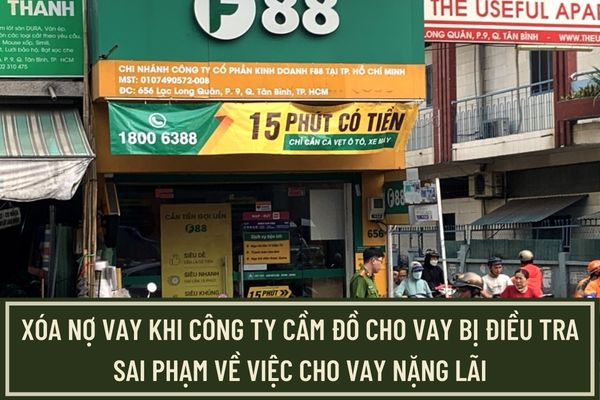Can the debt be written off if the pawnshop is investigated for usurious lending in Vietnam?
Are pawnshops in Vietnam allowed to provide loans?
According to Clause 4, Article 3 of Decree 96/2016/ND-CP, the pawnshop service business is a conditional investment business sector regarding security and order.
According to Decision 27/2018/QD-TTg regarding the Vietnamese economic sector system, pawnshop is classified under financial, banking, and insurance activities.
Pawnshop business activities are usually registered under industry code 6492: Other credit granting activities.
Additionally, according to Decision 27/2018/QD-TTg, other credit granting activities (6492) include:
- Financial services activities primarily related to the formation of loans by institutions not involved with monetary intermediaries (such as venture capital companies, specialist banks, investment clubs). These institutions provide the following services:
- Consumer credit granting;
- International trade finance;
- Long-term financial granting by specialized banks;
- Lending outside the banking system;
- Credit granting for house purchases by non-depository institutions;
- Pawnshop services.
According to Clause 4, Article 3 of Decree 96/2016/ND-CP:
The pawnshop service business, including the business of lending money where the borrower must bring legally owned assets to the pawnshop service establishment for collateral.
Thus, a pawnshop company is a conditional investment business engaged in the activity of lending money where the borrower must bring legally owned assets to the pawnshop service establishment for collateral.

Can the debt be written off if the pawnshop is investigated for usurious lending in Vietnam?
What is the current legally regulated interest rate for pawnshop loans in Vietnam?
According to Article 468 of the Civil Code 2015, the specific loan interest rate is regulated as follows:
Interest rate
1. The loan interest rate is agreed upon by the parties.
In case the parties have an agreement on the interest rate, the agreed interest rate must not exceed 20% per year of the loan amount, unless otherwise provided by relevant laws. Based on practical realities and as proposed by the Government of Vietnam, the Standing Committee of the National Assembly shall decide to adjust the above interest rate and report to the National Assembly at the nearest session.
If the agreed interest rate exceeds the maximum interest rate specified in this clause, the exceeding rate shall not be effective.
2. In case the parties have an agreement on interest payment but do not clearly define the interest rate and there is a dispute about the interest rate, the interest rate is determined to be 50% of the maximum interest rate specified in Clause 1 of this Article at the time of payment.
Additionally, Article 29 of Decree 96/2016/ND-CP stipulates as follows:
Responsibilities of pawnshop service establishments
...
6. The loan interest rate when receiving collateral shall not exceed the interest rate regulated by the Civil Code.
The loan interest rate when collateralizing assets at a pawnshop company should not exceed the maximum interest rate regulated by the Civil Code.
From the above regulations, it can be understood that the loan interest rate when pawning is agreed upon by the parties but must not exceed 20% per year of the loan amount. Thus, the average maximum loan interest rate per month will be 1.666% per month.
A pawnshop lending at an interest rate exceeding 20% per year when collateralizing assets is considered usurious lending.
What are the regulations on usurious lending according to the law?
Administrative penalty:
According to Point d, Clause 4, Article 12 of Decree 144/2021/ND-CP:
Violations of regulations on management of industries and occupations conditionally invested in security and order
...
4. A fine of 10,000,000 VND to 20,000,000 VND for one of the following acts:
...
d) Providing pawnshop services for lending money with collateral, but the loan interest rate exceeds the regulated rate of the Civil Code;
đ) Not registering investment in industries and occupations conditionally invested in security and order but providing money lending services with collateral or without collateral at an interest rate exceeding the regulated rate by the Civil Code;
If the loan interest rate is above 20% per year but does not reach 100% per year to be criminally prosecuted, or the violation nature is not sufficient for criminal prosecution, the individual will be fined 10,000,000 VND to 20,000,000 VND.
Note, the aforementioned fine applies only to individuals. In case of organizational violations, the fine will be twice that for individuals (according to Clause 2, Article 4 of Decree 144/2021/ND-CP).
Criminal liability:
According to Article 201 of the Criminal Code 2015 (amended and supplemented by Point i, Clause 2, Article 2 of the Law Amending Criminal Code 2017):
Crime of usurious lending in civil transactions
1. Anyone who in a civil transaction lends at an interest rate five times higher than the highest interest rate specified in the Civil Code, earning an illegal profit from 30,000,000 VND to under 100,000,000 VND, or has been administratively sanctioned for this act or sentenced for this crime, not yet having their conviction expunged but continuing to violate, shall be fined from 50,000,000 VND to 200,000,000 VND or subject to non-custodial reform for up to three years.
2. Committing the crime and earning an illegal profit of 100,000,000 VND or more shall be fined from 200,000,000 VND to 1,000,000,000 VND or imprisonment from six months to three years.
3. The offender may also be fined from 30,000,000 VND to 100,000,000 VND, prohibited from holding certain positions or practicing certain professions or doing certain jobs from one to five years.
A fine from 50 million to 200 million VND, or non-custodial reform for up to three years applies to the following cases:
- Lending with an interest rate of 100% per year or more and gaining an illegal profit from 30 million VND to under 100 million VND
- Or administratively sanctioned for usurious lending
- Or convicted for usurious lending but not yet having their conviction expunged.
In case the lender profits illegally 100 million VND or more, a fine from 200 million to one billion VND or imprisonment from six months to three years applies.
Additionally, the offender may also face additional penalties, including a fine from 30 to 100 million VND, prohibition from holding certain positions, practicing certain professions, or doing certain jobs from one to five years.
Can the debt be written off if the lender is investigated for usurious lending in Vietnam?
Regarding debt write-off, Article 468 of the Civil Code 2015 stipulates the allowable loan interest rate, which clearly states that the legally permissible interest rate is 20% per year.
In case the lender is investigated for usurious lending, it will be handled according to Clause 1, Article 468 of the Civil Code 2015:
Interest rate
...
If the agreed interest rate exceeds the maximum interest rate specified in this clause, the exceeding rate shall not be effective.
As for loan agreements with collateral where the interest rate exceeds the 20% per year limit, the exceeding portion will not be effective.
Therefore, money borrowers who collateralize assets may have a portion of the loan interest written off for the exceeding interest rate.
If the borrower has already paid the lender an interest rate higher than the regulation, it is considered an illegal gain. The authorities will confiscate such illegal gains according to Article 5 of Resolution 01/2021/NQ-HDTP. Specifically:
- Confiscation to the state treasury of:
+ Money or other property the offender used to lend;
+ Interest corresponding to the highest interest rate regulated by the Civil Code that the offender has collected from the borrower;
+ Money or other property that the offender gained additionally from using the interest and other illegal gains.
- Return to the borrower the illegal profit that the offender has actually collected, except in cases where the borrower used the loan for illegal purposes (such as gambling, illicit drug trading, fraud...), in which case the illegal profit is confiscated to the state treasury.
LawNet
